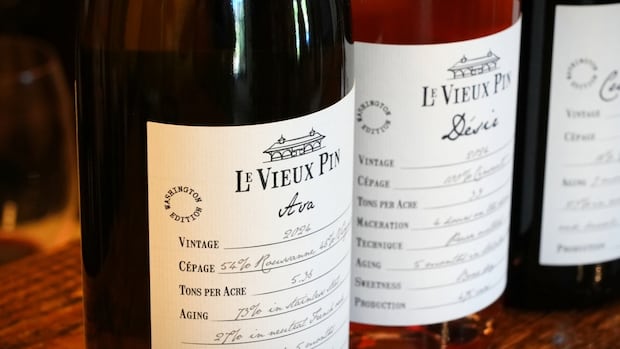Even on vacation, Canadians are carefully reading labels and are choosing to stay north of the 49th parallel this summer.
In a climate where demand for locally-made wine has increased, industry experts have noticed that consumers are conflicted when they find their favourite Okanagan vineyards selling bottles full of grapes that were grown south of the border.
B.C.’s wine industry was forced to take action after a cold snap in January 2024 froze grapes on vines throughout the Okanagan Valley, making for a meagre harvest.
Rather than rely on loans or a bailout, the B.C. wine industry asked the province to relax long-standing rules on the importation and taxation of wine grapes and juice, and it did.
“We didn’t have any grapes to make any wine,” said Séverine Pinte, the executive winemaker and viticulturist for Le Vieux Pin in Oliver, and La Stella in Osoyoos.
Able to source fruit from across the border, B.C. vintners flocked south to work with American growers.
In her role as the director for the British Columbia Wine Grape Council, and as a producer, Pinte is working to educate the public on what the label “crafted in B.C.” means, even when the grapes are from elsewhere.
Last year, a devastating cold snap wiped out 95 per cent of B.C.’s grapes, dealing a major blow to the wine industry in the Okanagan region in particular. Now, despite the chill on U.S.-Canada relations, the B.C. wine industry has had to resort to importing grapes from U.S. wineries, especially from Washington state, to get through the season. Shiva Reddy, a sommelier and On The Coast’s food and wine columnist, explores the reasons for optimism in B.C. vineyards this year.
She said that, initially, customers are often wary of the “Washington Edition” stamp on bottles she helped produce. However, she said once they taste the wine, “they’re seduced and that’s it.”
Regardless of where the grapes originate, Pinte has noticed a marked increase in visitors to wineries throughout the region.

Most vineyards in the Okanagan faced significant die-off in 2024 after a mild fall gave way to an extreme cold snap. After surviving several summers stymied by smoke, scorching heat and low yields, many B.C.-based wineries decided to import and process American-grown grapes to stay afloat at a time just before the election of U.S President Donald Trump.
“They bought it last year. Last year was another world, another story. It was completely different … We want those vineyards to survive,” said Sophie Jacob, a Quebecois tourist who rerouted and rescheduled her North American road trip to stay within Canada’s borders and spend more time in the Okanagan.
“They’re making good wines … It’s good for the economy here in the Okanagan Valley. So, we don’t have any problem with that.”

While Jacob has boycotted her trip to the States and refrains from buying American-made products, she feels wines crafted in B.C. using foreign grapes are still beneficial to the local economy.
Although many Canadians had already made the switch to Canadian-made booze, in March, the B.C. government formally suspended the importation of American alcohol.
The decision was in direct response to “escalating threats” and tariffs imposed by U.S. President Donald Trump, said B.C. Premier David Eby.
Since then, American alcohol has become a rarity on B.C. store shelves, like those stocked by Ethan Hrasko, the manager of a B.C. Liquor Store in Kelowna.
He said while wineries are seeing an increase in visitors, there has been an overall decrease in sales at B.C. Liquor Stores across the region.

However, he says the customers who do come in are making an effort to buy Canadian wines.
“It’s been an increase [in demand for B.C. wines] for sure,” said Hrasko.
“But it’s been met with a lot of caution as well due to some of the B.C. wineries substituting a lot of their white wine grapes for American-branded grapes or American-origin grapes because of a frost that happened in the Okanagan Valley.”
He said some customers have said they want to avoid all traces of American products, even if the grapes were pressed, fermented, aged and bottled in B.C.
“There is a lot more label reading.”

Hrasko estimates demand for American wines has dropped 27 per cent, while B.C. wine sales have dropped only two or three per cent since last year.
“[Customers] are trying to make sure they’re supporting the right businesses and look into buying local as much as they can. Some of the grapes are from the States, but they have been produced and turned into wine here. That has been a point of contention and conversation with some customers.”







